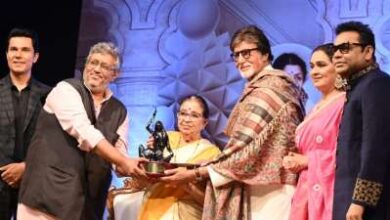Shilpa Shetty overcomes typecasting and gives her family credit
Bollywood actress Shilpa Shetty recently had a heart-to-heart conversation with her family about her experience through the film business, including topics like typecasting, support from her family, and her work after marriage. Shetty began the talk by thanking her family—especially her husband, Raj Kundra—for their steadfast support.

As she considered the early years of her career, Shilpa disclosed the difficulty of being typecast for over seven or eight years. She underlined that the 1990s were a distinct time period in which impressions were crucial. Her performance in the movie “Dhadkan,” which not only demonstrated her acting talent but also signaled a change from the flashy parts that had characterized her prior career, marked a turning point, however.
“The 1990s were a different era, but it’s not like I wasn’t acting,” Shilpa said. Dharmesh Darshan, the film’s director, was instrumental in shattering the glamorous stereotype and portraying Shilpa in a fresh way. In “Dhadkan,” Anjali was a stylish figure with a hint of Indianness, which made her appeal to a broad audience while yet being elegant.
This change of perspective made it possible for Shilpa to investigate a variety of characters in later productions, including “Rishtey,” “Phir Milenge,” “A Life In A Metro,” and “Dus.” These movies were important turning points in her career since they gave her the chance to play a variety of roles. The actress credits “Dhadkan’s” popularity and reception, which broke free from the limitations of typecasting, for this pivotal period in her life.
Shilpa Shetty spoke on how her family, especially her son Viaan, influenced her career choices in addition to her professional experience. She acknowledged that the support of her family, particularly her husband Raj Kundra, had been the source of her strength amid her career’s highs and lows.
As she breaks down obstacles and rewrites the course of her career in the film business, Shilpa Shetty’s narrative offers hope to aspiring actors who are battling social expectations and typecasting. According to her own words, overcoming being typecast and going on to play a variety of roles is a credit to skill, tenacity, and the priceless support of loved ones.







